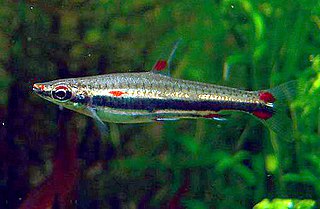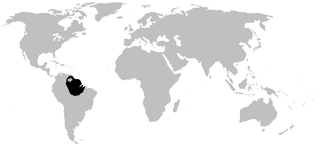 W
WThe arapaima, pirarucu, or paiche is any large species of bonytongue in the genus Arapaima native to the Amazon and Essequibo basins of South America. Genus Arapaima is the type genus of the family Arapaimidae. They are among the world's largest freshwater fish, reaching as much as 3 m (9.8 ft). They are an important food fish. They have declined in the native range due to overfishing and habitat loss. In contrast, arapaima have been introduced to several tropical regions outside the native range, where they are sometimes considered invasive species. Its Portuguese name, pirarucu, derives from the Tupi language words pira and urucum, meaning "red fish".
 W
WThe brown-banded water snake is a species of aquatic snake found in tropical South America and Trinidad and Tobago.
 W
WThe cane toad, also known as the giant neotropical toad or marine toad, is a large, terrestrial true toad native to South and mainland Central America, but which has been introduced to various islands throughout Oceania and the Caribbean, as well as Northern Australia. It is the world's largest toad. It is a member of the genus Rhinella, which includes many true toad species found throughout Central and South America, but it was formerly assigned to the genus Bufo.
 W
WThe gilded catfish or jau is a South American catfish of the family Pimelodidae. Also known as manguruyu or black manguruyu.
 W
WThe porthole shovelnose catfish or spotted shovelnose catfish, Hemisorubim platyrhynchos, is the only species in the genus Hemisorubim of the catfish family Pimelodidae.
 W
WThe redtail catfish, Phractocephalus hemioliopterus, is a pimelodid (long-whiskered) catfish. In Venezuela it is known as cajaro and in Brazil it is known as pirarara, stemming from the Tupi language words pirá and arara. It is the only extant species of the genus Phractocephalus. This fish is common in the aquarium trade, although its massive adult size makes it unsuitable for all but the largest aquariums.
 W
WAcanthodoras cataphractus more commonly Spiny catfish, is a species of thorny catfish found in rivers of Bolivia, Brazil, Colombia, French Guiana, Guyana, Peru, and Suriname. This species grows to 11.5 cm (4.5 in) in SL. This fish is found in the aquarium trade.
 W
WThe electric eel is a South American electric fish. Until 2019, it was classified as the only species in its genus. Despite the name, it is not an eel, but rather a knifefish.
 W
WErythrolamprus cobella, commonly known as the mangrove snake, is a species of small semi-aquatic snake, which is endemic to South America.
 W
WFarlowella nattereri is a species of armored catfish of the family native to Bolivia, Brazil, Colombia, Ecuador, Guyana and Peru. It occurs in the upper Essequibo and Amazon basins. This species grows to a length of 26.5 centimetres (10.4 in) SL.
 W
WGonatodes is a genus of New World dwarf geckos of the family Sphaerodactylidae.
 W
WHemiodontichthys acipenserinus is the only species of the monotypic genus Hemiodontichthys, a genus of the family Loricariidae of catfish.
 W
WHenonemus is a genus of pencil catfishes native to South America.
 W
WNannostomus trifasciatus,, commonly known as the three-lined or three-stripe pencilfish, is a freshwater species of fish belonging to the characin family Lebiasinidae. They are popular in the aquarium trade due to their small size, beautiful color pattern, and relative hardiness.
 W
WOxybelis aeneus, commonly known as the Mexican vine snake or brown vine snake, is a species of colubrid snake, which is endemic to the Americas.
 W
WNannostomus,, is a genus of fish belonging to the characin family Lebiasinidae. All of the species in this genus are known as pencil fish or pencilfish, a popular name that was first only applied to two species in the 1920s, Nannostomus unifasciatus and Nannostomus eques, but by the late 1950s would come to be applied to all members of the genus. Several of the species have become popular aquarium fish due to their attractive coloration, unique shape, and interesting demeanor.
 W
WSiphlophis compressus is a snake found in tropical Central and South America and Trinidad and Tobago. It feeds on small lizards and probably on frogs and nestling birds.
 W
WThe Tukeit Hill frogs are three species of frog in the genus Allophryne. Originally erected for the species Allophryne ruthveni, the genus was placed as the only member of the subfamily Allophryninae, which was in turn placed in the family Centrolenidae, but they are now considered as the only genus in the monotypic family Allophrynidae.